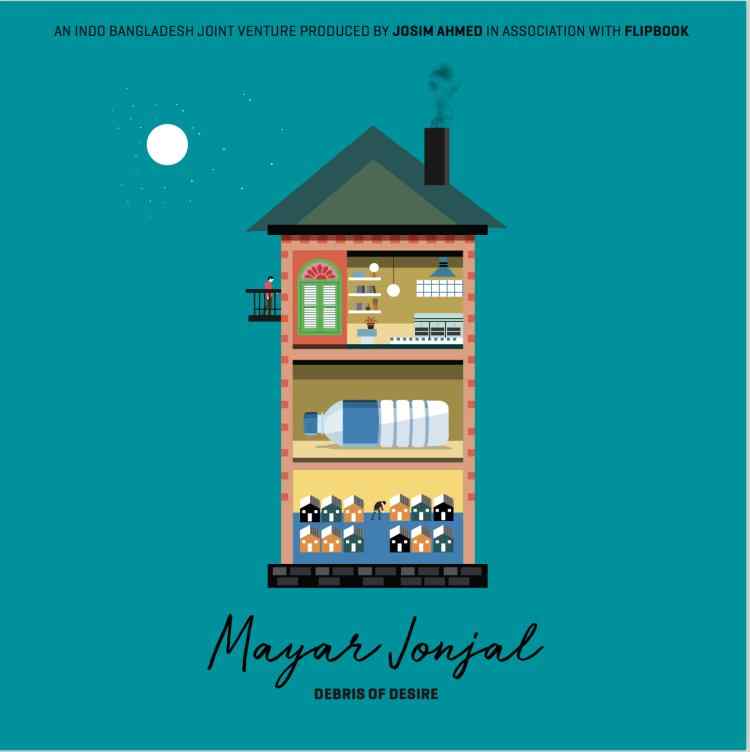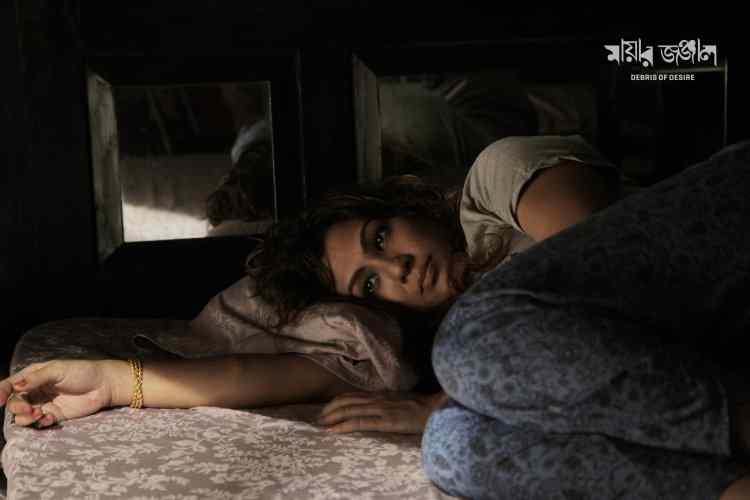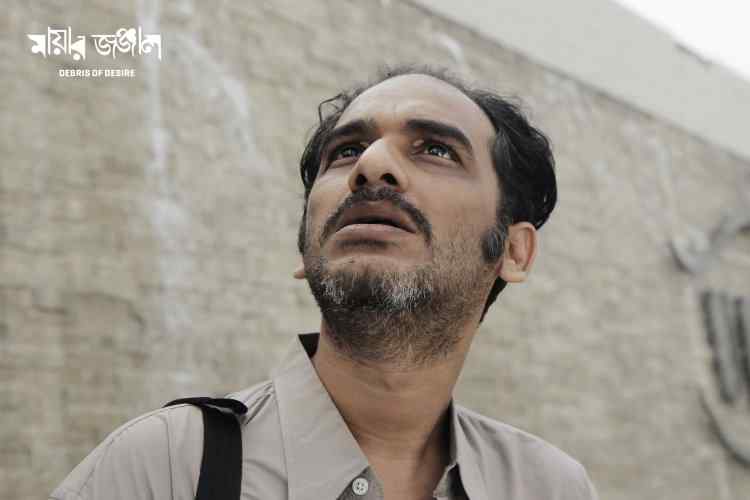Film Review: MAYAR JONJAL (Debris of Desire)- A MOVING FILM BASED ON MANIK BANDOPADHYAY’S WRITINGS

The film offers a beautiful collage of the city and its people we may never meet in real life but who are as flesh-and-blood as we are and live in the same city as we do, writes Shoma A. Chatterji.
People who live on the fringes of the mainstream, steeped in want, anonymity, and desperation to reach somewhere find space in documentary films but rarely in feature films. Literature however, has always been an exception. Classical writers of fiction like Munshi Premchand or Bibhuti Bhusan Bandopadhyay or Vijay Dan Detha have often placed the marginallised and the ignored right in the centre of their stories and novels. Mayar Jonjal (Debris of Desire) based on two stories by Manik Bandopadyay is an Indo-Bangladesh production by Bangladeshi filmmaker Josim Ahmed and the Indian production house Flipbook, won the Jury Award for Feature Film out of the 8 films from the official selection in the 21st Asiatica Film Festival (Asiatica - Encounters with Asian Cinema), in Italy.Mayar Jonjal also made it to the official selection of the Moscow International Film Festival and Shanghai International Film Festival (SIFF). The Bangladesh-India joint production was part of the Asian New Talent Award at SIFF. MayarJonjal is a very dark and sad film but you like the light it sheds on a world you live in but do not know about.
Manik Bandopadhyay’s writings offer a world where one ventures into paths filled with sharp stones, wet earth and rocks and sharp edges. He was a writer born ahead of his time. He died, reportedly in penury, at the young age of 48. But within that brief span, he wrote 36 novels and nearly 250 short stories, most of them defining not only a new style of writing but also opening up a completely new world of the marginalised and the oppressed in which he cut open the economic deprivation of his characters to expose their ever-changing emotional vacillations they suffer rooted in societal inhibitions. But the complexity of the characters and their interactions kept filmmakers away probably because these stories had little value in terms of the box office. There are no dance numbers, the romance is very subtle or not there at all and the sex is raw and real.
Among the few celluloid exceptions where his story/novel has been the foundation of a film, the latest to join in is Indraneel Roy Choudhury’s Mayar Jonjal (Debris of Desire) running in the theatres in West Bengal right now. Roy Choudhury has blended the two stories as a single film and done it so well that one cannot make out that the film is based on two different stories. The time has been brought forward from the 1950s to the present time, and the film has been shot in places, bylanes and narrow gullies and parks not frequented by the elite or the intelligentsia. This invests the scenario with a different texture we do not often see but the characters peopling the stories do.

Image: film still
The film has been shot in areas of Kolkata which reveal the underbelly of spaces middle-class Bengalis are hardly aware of though we do know that the people described in the film certainly exist caught in the constant struggle of trying to eke out a hand-to-mouth existence either through sex work, or drug trafficking, or working as a made in a very rich man’s home, or, just not doing anything but drinking, gambling, sleeping at work as security guard at an ATM kiosk and losing his job as a consequence.
The characters are drawn from the margins such as – a small-time criminal who deals in dangerous drugs. A sex worker lives and practices her trade from a whorehouse where one can constantly hear temple bells from somewhere close by. There is a wholesale fish trader who wanted to be a classical singer and also got a guru to train him in Benares but was driven into the fish trade and likes to share some of his booty with the girls in the whorehouse. A security guy who loses his job because he either sleeps on the job or is completely drunk. His wife Soma gets a job as a maid with a stinking rich family because she wants to place her son in a good school. Her husband suspects her motives and wants her out of the job which she cannot because he is unemployed. How these diverse characters get entangled into each other’s lives and the tragedies that befall them makes for their wretched life stories without an exit point. Manik Bandopadhyay often kept his closures open, leaving his readers to draw their own conclusions.

Image: film still
Except Rittik Chakraborty who plays Chandan, the security guard, the other actors are drawn from the fringes of the film and television industry and are not top stars. But they are excellent in getting under the skin of the out-of-the-box characters. Bratya Basu as the wholesale fish trader is excellent as is Chandreyee Ghosh as Beuti, the sex worker who is loud and coarse, pushed into the trade by her husband who brought her from Bangladesh and trafficked her in Kolkata to go back and settle down with another woman. But she does not forget to apply vermillion to her hair. Why? No one knows. Soma is a frustrated housewife married to Chandan, an irresponsible husband who gets trapped in the illegal drug trade and gets arrested. The small time criminal Satyen, son of a chit fund operator who dealt in illegal real estate, switches over to drug peddling in stuffed paans with the help of another underworld guy Pele. He has an eye on the money and gold Beuti has accumulated in a benaami account. But, in a strange way, he also falls in love with her.
An ironical touch is Beuti and Soma’s snobbish employer getting their hair done in the same beauty parlour suggesting how beauty parlours are more democratic than the society they function within. Soma makes friends with her employer’s old father-in-law during their morning walks together towards a maidan where she watches, with great interest, different groups of people either practising to laugh in a laughing club, or, dressed-in-white women practising yoga in another corner of the maidan, or, NCC cadets doing march practice, or, a rag-picker constantly picking rags for what no one knows because she refuses to take a Rs.200 note from Beuti’s fish-business customer!
The camera travels across locations we do not generally frequent including the high-rise where Soma goes to work. Some scenes are repeated like metaphors of a cross-section of people who inhabit the city. The underground characters have strange names like Joga-da, who runs a syndicate and is involved in political mafia action, appearing only in the opening frames of the film, or Lebu, who works for Joga-da, or Pele, who has reluctantly offered shelter to Satya after he is released from jail.
The sound design is brilliant. You can hear the sound of temple bells in the distance from where the sex workers live and work. Or, the loud sounds of breathing in and out by the exercisers and their coach, or, the military trainees/scouts marching back and forth early in the morning in their routine to begin the day with. Sounds of love-making can be heard from across the thin walls of Beuti’s room, commenting on the pitiable lack of privacy when these girls are at work. Beuti, however, looks a bit of a misfit in her dowdy surroundings as she is very beautiful and well-styled.
The film offers a beautiful collage of the city and its people we may never meet in real life but who are as flesh-and-blood as we are and live in the same city as we do. The camera is constantly on the move from the river bank where Joga-da is having his lunch in the open to that park where men and women meet to do their laughing exercises, to the terrible slum where Chandan lives with his wife, mother and son, through the red-light slot where sex workers wear very modern attire and do not seem to be lorded by any madam, to a police station where the policeman is very angry because Satya woke him up at four in the morning. The small touches of life and the living make it an experience not to be missed. Such as Soma and Chandan’s little boy learning music at home from a music teacher in the opening frames of their story. It is an anthology of two short stories by Manik Bandopadhyay but Indranil has woven them seamlessly to make it a cohesive whole.
***
About the author: Dr. Shoma A. Chatterji is an Indian film scholar and author based in Kolkata
What's Your Reaction?

































































